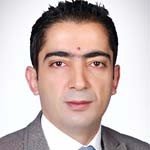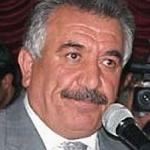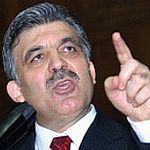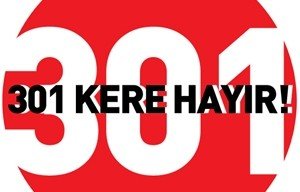The Malatya 3rd High Criminal Court convicted a total of 11 people, among them Labour Party (EMEP) Tunceli Provicial Chairman Hüseyin Tunç, Tunceli Associations Federation (TUDEF) President Özkan Tacar, Socialist Platform of the Oppressed (ESP) activists and former Democratic Society Party (DTP) Tunceli Provincial Chairman Murat Polat.
9 defendants were found guilty of "propaganda for an illegal organization" as defined by article 7/2 of the Anti-Terror Law (TMK) and sentenced to 1 year imprisonment. The other 2 convicts received a mitigated prison sentence of 10 months because of "good conduct". We were notified of the court's reasoned decision just a short time ago on 10 November 2009.
Reasoned decision: defendants said "guerrilla" and "Martyrs don't die"
11 PKK members were killed last year in a military operation in the rural area of Tunceli-Nazımiye-Büyükyurt in eastern Turkey. Upon this incident, Murat Polat and Hüseyin Tunç made a public press release in the town centre of Tunceli on 11 April 2008.
After the press release the Prosecutor's Office initiated an investigation. As a result, the Malatya 3rd High Criminal Court opened a case against 11 people under charges of article 250 of the Criminal Procedure Law (CMK). The trial resulted in the reasoned decision, read excerpts of the decision as follows:
"Defendant Murat Polat ended his speech by saying 'We got to know that 11guerrillas, members of HPG (People's Defence Forces), lost their lives during the announcement of the Tunceli Governorship'. 'We express our condolences to the families and friends of the HPG guerrillas that died that day in the clashes'. "Hüseyin Tunç used the phrase 'the military made our guerrilla youth martyrs'. The other defendants shouted the slogan 'Şehit Namırın' ('Martyrs Don't Die'). Several defendants also shouted the slogan 'Guerrilla is an honour, claim that honour'. It can be understood from the contents of the entire file that the defendants "... can be described as guerrilla. The members of the 'black gang', the PKK, characterized as a 'terror organization', conducted activities aiming to destroy the unity of the country. The PKK terror organization members aimed to make their actions look legal. Members of terror organizations and terrorists were not accepted and they turned the action labelled as press release into a meeting of the organization with the aim to get the people to accept them that way. By doing so, they opposed the legal actions of the security forces. They tried to persuade the crowd by claiming the killed terror organization members were martyrs. It is understood that after the killed organization members were taken to the hospitals mortuary, they spread propaganda with the aim of establishing the organization's ideas, views and opinions and aiming to reach a huge crowd of people with the organization's views and thoughts to win the people over..."
It must be said that the prosecutors and the courts evaluated the slogan "Martyrs Don't Die" under the aspect of article 215 of the Turkish Criminal Code on "Glorification of Crime and Criminals". In this case usually a monetary fine was handed to the defendants.
However, in the course of the amendments of the Anti-Terror Law no. 3713, dd. 29 June 2006 and law no. 5532, both the prosecutors and the courts evaluate this kind of slogans in the context of the Anti-Terror Law.
The penalty is a clear violation of the law
It has to be emphasized the Anti-Terror Law foresees concrete penalties. The punishments cannot be postponed or converted into a fine (article 13 TMK).
The punishment in this trial is clearly violating the law. First of all, "Guerrilla" is a linguistic term. The court evaluates the use of a linguistic term as propaganda. Again, it is legally not understandable how the crime of propaganda for an organization can be generated out of the term "Martyr".
The court did not even watch the CD showing records made by the police, footage the decision was actually based on. Tunceli Foundations President Özkan Tacar and several other defendants stated that they had not shouted slogans. Nevertheless, the court did not order an analysis of the CD records by an expert. The conviction was exclusively based on the police report.
However, the Criminal Procedure Law says, "The judge can base his/her decision on evidence brought and discussed before the court. This evidence can be evaluated freely in all conscience of the judge". According to this clause and in the context of the "right to a fair trial" the CD records in particular had to be analysed by a specialist and had to be watched and discussed in the hearing. Because, immediacy, completeness and discussion are the most important principles of prosecution.
Anything else but praising the Dersim Massacre is a crime!
The Diyarbakır High Criminal Court punished a candidate of pro-Kurdish Democratic Society Party (DTP) under charges of "propaganda for an illegal organization" in the context of CMK article 250 because the DTP candidate shouted slogans in the candidate's promotion meeting.
In provinces like Diyarbakır and Adana children throwing stones in demonstrations receive prison sentences of dozens of years...
In this country whatever you say and whatever you do is a crime, even a big crime... Except for praising and defending the Dersim Massacre and spreading "war propaganda"...
While the government is opening up, the judiciary gets locked up! (BY/EÖ/VK)










